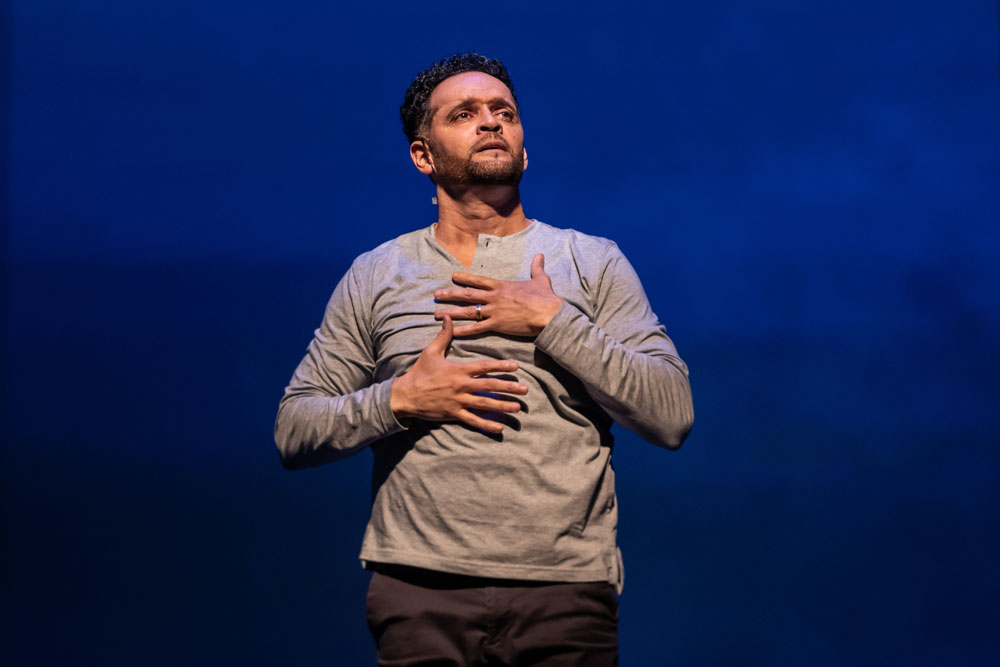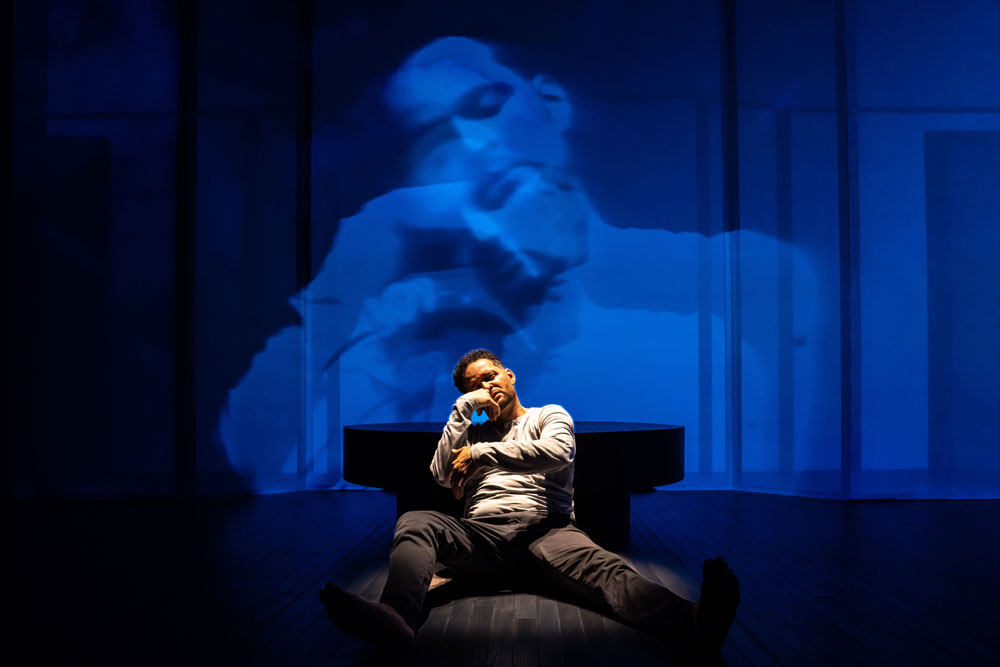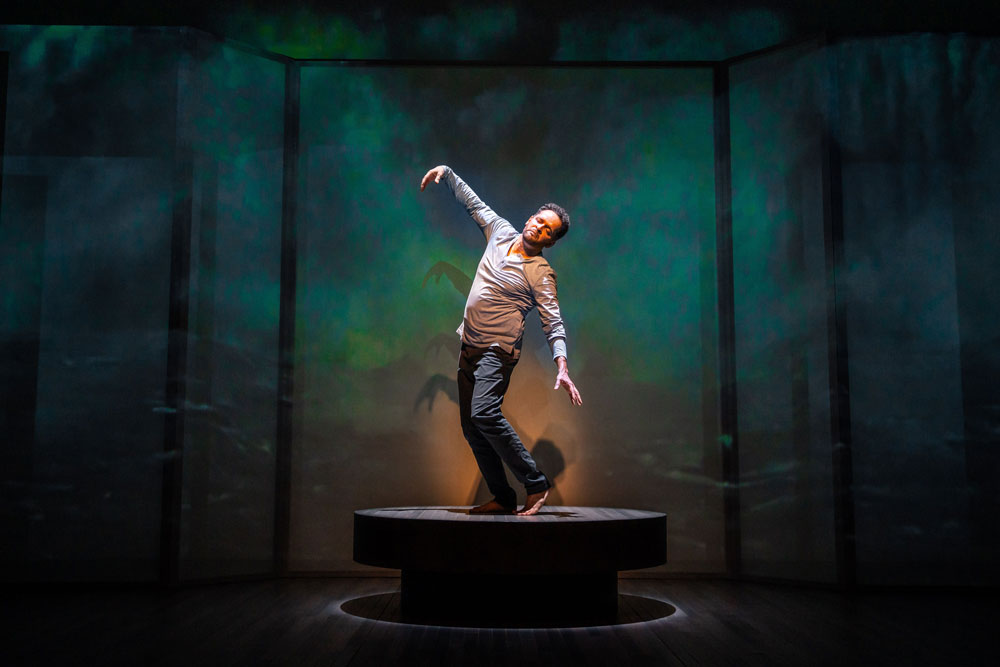
Life changes with the birth of children. The demands and obligations of parenthood pull us out of ourselves and force us to focus on the people we bring into the world. Sacrifice and the suppression of our own wishes and passions are often necessary to insure our offspring get a fair shot at life.
Those are the types of realities driving Antonio’s Song/I Was Dreaming of a Son, the beautiful exploration of self now playing at Goodman Theater. The birth of a son triggered Antonio Edwards Suarez’s desire to write the play. A record of what it is to be a father in charged times, this dramatized memoir goes a step further to look at the conditions and people that influence the kind of parents we become. Thinking of how hard it would be to “raise a boy in today’s world” and carefully examining his own childhood in Brooklyn, Suarez uses Antonio’s Song to step back in time. We travel with him as he wonders how much of the way he was raised will impact how he rears his son.
In the one man play, a blind peak of rage and frustration directed at his young son sets this journey of reflection, discovery and catharsis in motion. It’s a violent depiction of what happens in that flash of an instant when darkness overpowers reason; just before plunging the psyche into regret. The odyssey it launches is easily one of the most beautiful imaginable. By re-inhabiting his life growing up in New York City’s most populous borough and its heavily Latino enclave of Bushwick, Suarez transports us to a rich and little known universe. One where the order of life conforms to its own rules.

Suarez holds this world and its people up as if they’re contained in an orb. Because it’s populated with Black and brown people, many the products of diaspora, its layers are dense, complicated and full. We’re shaped by place as well as by people, and these are Suarez’s roots. He not only recalls those who helped form and shape him, he becomes them. Because they’re so full of intimacy and empathy, his re-enactments of key life episodes serve as irresistible emotional lures and important points of revelation. Raw and intense, other sequences not only take us deeper and deeper in this intricately complex life, they highlight the constant struggle to be more. A small brown boy with a light voice in a world that calls for gladiators may learn to survive; but finding fulfillment is a much harder task.
The structure of the play, as well as its tone and rhythm, are constant sources of fascination throughout the production. The first allows Suarez to be both the narrator and each of the play’s central characters. Thanks to the help of Alexandra Beller, the project’s movement director, Suarez slides smoothly into the skin of his father, his mother, his sister, Pinky, and sundry others who populated his universe while he was coming of age. Honest, unflinching, often brutal and always startlingly beautiful; the writing has the ring of poetry and can strike with the force of a fist.
Suarez’s intention was to write the play alone. But after working on it for nearly a decade, he realized his closeness to the material was an impediment. Another perspective and the intuition of another writer would be needed to realize his goal. A long-time admirer of playwright Dael Orlandersmith’s writing, he eventually got the opportunity to sit down and talk to her about the project. That meeting led to the collaboration that created this theatrical jewel. Their common knowledge of what life is like growing up on streets where police prey on Black and brown boys, and their understanding of the anger it engenders, are among the components that anchor the integrity of Antonio’s Song.

It’s also unique how the play’s depth of the humanity gives us new eyes. To varying degrees, providence or luck can prescribe the paths we follow. Suarez’s father, Mark, sold guns to make money. Hand guns. It’s a hustle that conjures up judgment as well as a certain profile. But to relax and to express himself, his father carved wood; masks or anything his mind desired. Watching his father smile with unconscious pleasure as he worked in his medium with “artist hands”, he saw the truer image of who and what his father was. A man who had grown up fatherless, and who accepted and made do with the slim options available to him to cover the rent and buy groceries for his family. When the young Suarez stumbled onto Mikhail Baryshnikov dancing on television, he was so transfixed that he wanted to do what he saw this man did; dance with strength as well as grace. His father understood. His mother, “a Latina from Bushwick with an Irish father who left”, did not. Chain smoking in the dark as she watched TV and stewed in bitterness, the hardness of his mother was like the anger and hardness of the streets. Demanding much and giving little.
It’s not uncommon to find salvation in the things that make us different. Attraction to dance took him down a gratifying path. Through a close friend who was more confident in charting his own way, Suarez was introduced to theater. That introduction led to a consuming interest and then a career. One that fueled his escape from the Brooklyn of his childhood and secured for him success. Now, what he most craves is being worthy of having realized his dream of having a son. Antonio’s Song covers the difficult terrain that will take him there.
Suarez’s performance in this magical piece is remarkable. True to a dancer’s nature, he’s rarely still. Sweeping through the scenes of his evolving life, he’s in perpetual unrushed motion as he searches for and finds the insights to make him the father he wants to be. Jared Mezzocchi’s projection designs simulate everything from Brooklyn brownstones to disco balls and crashing surf with sublime beauty. Their hazy edges and soft shades create an ethereal world softened by the perspective of time.
Antonio’s Song/I Was Dreaming of a Son
Goodman Theatre
Through May 28, 2023
170 N. Dearborn Street
Chicago, IL 60601